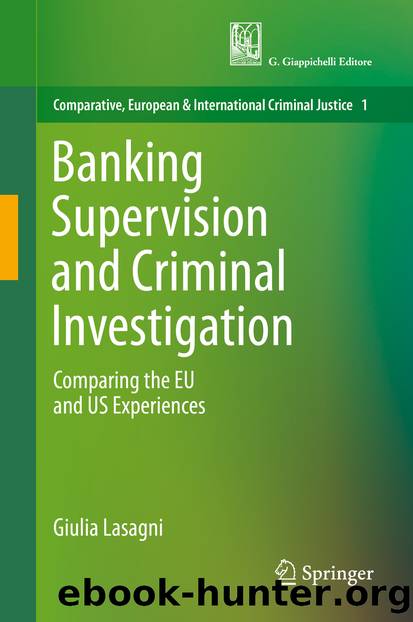Banking Supervision and Criminal Investigation by Giulia Lasagni

Author:Giulia Lasagni
Language: eng
Format: epub
ISBN: 9783030121617
Publisher: Springer International Publishing
6.3 Fair Trial Guarantees and Banking Supervision: The Right to an Independent Tribunal
A major issue concerning the compliance of the SSM sanctioning proceedings with Article 6 ECHR, and Article 47 CFREU is whether the supervisor’s structure, and in particular its decision-making body, possess the requirements to be defined an “independent and impartial tribunal established by law”.
The first step in this assessment is to determine when a decision-making body can be named a “tribunal”194; a point upon which, as repeatedly underlined by legal scholars, both European Courts have not developed a homogeneous and comprehensive definition yet.195
The ECtHR, on its side, considers as a primary criterion the acknowledgement of a “judicial function” to the adjudicating authority, defined as the capability of “determining matters within its competence on the basis of rules of law and after proceedings conducted in a prescribed manner”,196 and the “power to give a binding decision which may not be altered by a non-judicial authority”.197
Putting the attention on “teleological” parameters, rather than on structural features typical of judicial bodies, such as internal independence, the Court in Strasbourg therefore interprets rather extensively the concept of “tribunal”, It follows that, under certain circumstances, also administrative bodies may fall under this definition. As renowed, in fact, this broad interpretation was developed by the ECtHR to extend—when the sanctions imposable present a substantive punitive nature—the fundamental safeguards of the criminal matter also to proceedings carried out by administrative authorities, which usually provide for far lower standards of protection to the parties involved. This jurisprudence certainly brought to an improvement for the position of the subjects of punitive administrative investigations, it may also be criticized for several reasons.198
First, such jurisprudential notion of tribunal lacks of foreseeability and thus of legal certainty, inasmuch as the assessment on the substantial nature of sanctions and therefore over the possibility to consider an administrative authority a tribunal under Article 6 is made on a case by case basis. The consistency of the case-law may of course provide for some hints of predictability as to whether a certain system may be considered so, but no legal certainty can be reached before a specific decision is issued.199
Moreover, this jurisprudence seems somehow to undermine at its basis the very notion of “tribunal” in its more traditional, and “constitutional” interpretation. Tribunals, indeed, are undoubtedly characterized, even more than by their function, by their independence both from external powers, and from internal pressures.
The parameter of “external” independence has been taken in due account by the case-law of the ECtHR, which repeatedly affirmed that, mostly in cases concerning administrative or disciplinary tribunals, imposing punitive sanctions, the fact that the decision-making body exercises “judicial functions” does not suffice to make it a proper tribunal under Article 6 ECHR.200 To do so, these bodies shall indeed fulfil a series of further requirements concerning the principles of independence and impartiality, which represent the basis on which fair trial guarantees can be built upon.
Specifically, a “tribunal” shall be considered independent from the legislator,201 the executive and other third
Download
This site does not store any files on its server. We only index and link to content provided by other sites. Please contact the content providers to delete copyright contents if any and email us, we'll remove relevant links or contents immediately.
International Integration of the Brazilian Economy by Elias C. Grivoyannis(111057)
The Radium Girls by Kate Moore(12027)
Turbulence by E. J. Noyes(8047)
Nudge - Improving Decisions about Health, Wealth, and Happiness by Thaler Sunstein(7706)
The Black Swan by Nassim Nicholas Taleb(7128)
Rich Dad Poor Dad by Robert T. Kiyosaki(6632)
Pioneering Portfolio Management by David F. Swensen(6300)
Man-made Catastrophes and Risk Information Concealment by Dmitry Chernov & Didier Sornette(6019)
Zero to One by Peter Thiel(5801)
Secrecy World by Jake Bernstein(4751)
Millionaire: The Philanderer, Gambler, and Duelist Who Invented Modern Finance by Janet Gleeson(4478)
The Age of Surveillance Capitalism by Shoshana Zuboff(4291)
Skin in the Game by Nassim Nicholas Taleb(4248)
The Money Culture by Michael Lewis(4207)
Bullshit Jobs by David Graeber(4190)
Skin in the Game: Hidden Asymmetries in Daily Life by Nassim Nicholas Taleb(4004)
The Dhandho Investor by Mohnish Pabrai(3764)
The Wisdom of Finance by Mihir Desai(3746)
Blockchain Basics by Daniel Drescher(3581)
